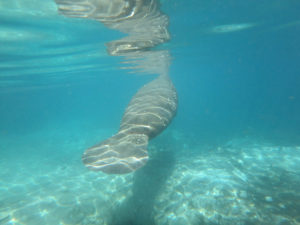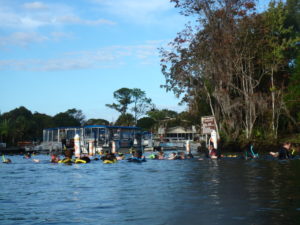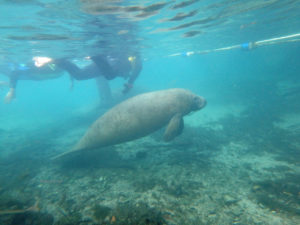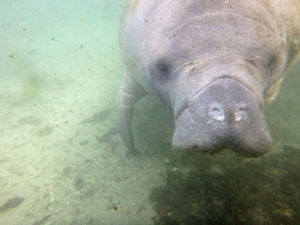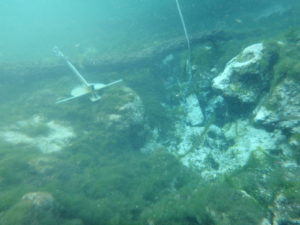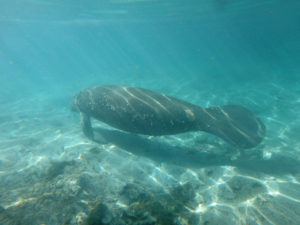At the time of writing this article, the West Indian Manatee, and its two subspecies, the Antillean and Florida Manatee, is still listed on the Endangered Species List. There is a current proposal before the U.S. Fish & Wildlife Service to change their classification from Endangered to Protected, which could potentially impact their continued recovery.
It’s been a few years since I traveled down to Crystal River, Florida, for the yearly migration of manatees moving inland to overwinter in the warm springs that they depend on during the winter months, only this time as my friend and I glided in on kayaks, I noticed another migration – an over-abundance of tourists.
Manatees are a big draw, monetarily speaking, and Crystal River is one of the most easily accessible destinations that allows tourists to get up close and personal with these gentle giants. On the down-side, it has humans and manatees competing within the same finite resources – Florida’s crystal clear springs.
In an effort to strike a balance between the needs of the manatees and the wants of the humans, the Crystal River National Wildlife Refuge has begun a monitoring program that ensures that during periods of extreme cold, the sanctuary at Three Sisters Spring will close to human intrusion so that the manatees can rest undisturbed. Naturally, the winter months experience the most closures to human access. There are still areas within Kings Bay that will allow humans to view and swim alongside of manatees outside of sanctuary boundaries, as well as Homosassa River just a few miles away.
There is a boardwalk/viewing area at Three Sisters Springs Visitor Center, however, there is no parking available and visitors must purchase tickets and take a trolley that runs every half hour from the Visitor Center to the Springs. Budget-minded visitors may want to consider Ellie Schiller Homossassa State Park instead, because it also hosts a manatee viewing platform on the river, included with the cost of admission into the wildlife park, and has more things to see and do.
Fortunately, for now, we were still able to enjoy our kayaking/snorkel trip with the manatees. Being able to swim with these big curious creatures is both a joy and an educational opportunity. One can float quietly just outside of the sanctuaries and inquisitive manatees will approach at their leisure to have a look at their human visitors. Its magical moments like these that continue to inspire people to learn more about these amazing animals and educate others about them.
I understand the need to protect the manatee, and it is my fervent hope that further restrictions will not take this amazing opportunity away. Currently, the biggest threat to the manatee is the removal of “No Wake Zones” within Kings Bay and surrounding waterways, and the continued pollution by nitrates into the aquifer that feeds the springs. Nitrate laden water feeds the algae that chokes out the plants that the manatees need to feed on.
So if you’re planning on visiting the manatees, do your research ahead of time to see if the rapidly evolving protections will impact your trip. You can do that by visiting the Crystal River National Wildlife Refuge and Florida Fish and Wildlife Conservation Commission websites for more information.
[codepeople-post-map]

